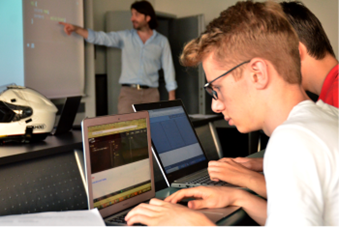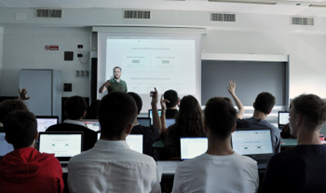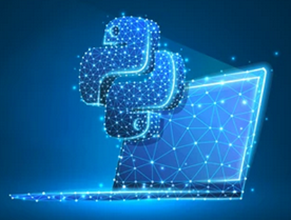Summer Python course for high school students
Python: a language for world inventors
Milan – Leonardo Campus | June 9-13, 16-20

This is the summer coding course dedicated to high school students (starting from the second year) to develop “computational thinking”, i.e. the ability to deal with problems of different types (even the daily ones!) using the conceptual and technical tools of Computer Science. In this adventure you will be guided by the experience of professors and experts from the Politecnico di Milano.
Why coding
There are languages with which ever greater parts of our world are built: languages that give life to the applications that run on our computers and mobile phones, or with which we teach cars how to brake better (and safer!) than we ever could do us, or instruct objects how to communicate with each other, with which we are reinventing the concept of money, or build entire social worlds, and much more.

You’ve probably heard of coding: it’s the ability (and art!) of speaking these languages, and it’s practically a superpower nowadays! Potential solutions to intricate problems, imaginary universes, bold hypotheses about the meaning of the data we collect from the world around us, all of these things can be brought to life through code! You can explore millions of imaginary worlds, create universes with alternate laws of physics, and express and communicate complex ideas.
Not just a simple Python course.
In this course we will introduce Python, a powerful exploration and programming language, which will offer you some interesting possibilities: programming the objects that surround you, imitating some aspects of human intelligence, writing video games, processing images, and synthesizing music.
Most importantly, you’ll develop a powerful way to extend your thoughts, and you’ll get a better idea of what’s possible with computers.
The coding course
We therefore start from the consideration that computers, nowadays, are increasingly present in our lives, often even without us realizing it, and we are their users. The idea of the course is to “open the box” and to put the students in front of the creative possibilities offered by this technology. Many of us play games made by others, but what if we were able to create new ones ourselves?
The course will have a total duration of five days, which will be dedicated to the analysis, study and exploration of applications of the code and even “bizarre” consequences, which will touch on various issues, from scientific, cultural, up to even existential ones!

Course programme
The course will be mainly structured in two parts, one in the morning and one in the afternoon, under the direction of professors from the Polytechnic.
In the mornings the course will be oriented towards lessons that will introduce the tools of computational thinking. After introducing the basics of the Python language, these will be applied to solving small problems. Once the basics have been learned, we will move on to more complex elaborations up to the presentation of tools that will allow us to create new and original worlds.
The afternoons will be devoted to laboratory sessions that will allow the students to apply the acquired skills all-round. In the second half of the course, students will learn how to autonomously create their own worlds, aiming to create a new game.
Like all TechCamp summer courses, the approach is hands-on, to provide a true STEM-style experience (a term used to indicate scientific-technological disciplines such as: science, technology, engineering, mathematics and the related various study courses).
Technical requirements
To take part in the course, you will need to bring your own laptop computer. Under no circumstances may you use a tablet. The necessary software would not be properly supported.
You will need one of the following operating systems with Office installed:
- Windows 7 (or later) or Windows Server (2012 R2+)
- MacOS 10.10 (or later)
- Linux (deb and rpm format)
Before the start of the course, you will have to download version 3.9 of Python and Jupyter, which are included by default on the Anaconda platform (a Python installation and package distributer), which you can download here: https://www.anaconda.com/products/individual
If you have any doubts you can write an email to assistenzainformatica.techcamp@gmail.com or join the Telegram group.
Video presentation
Presentation slides:
Course details
![]() Starting dates: 09.06.2025
Starting dates: 09.06.2025
16.06.2025
![]() Duration: 1 week
Duration: 1 week
![]() Lessons timetable: 09:30 AM - 04:30 PM
Lessons timetable: 09:30 AM - 04:30 PM
![]() Price: 800,00 €
Price: 800,00 €
![]() Certification: Certificate of attendance
Certification: Certificate of attendance
![]() Language: English
Language: English
![]() Teachers: Prof. Francesco Bruschi :: Prof. Vincenzo Rana :: Prof. Jessica Leoni
Teachers: Prof. Francesco Bruschi :: Prof. Vincenzo Rana :: Prof. Jessica Leoni
![]() Reference websites: DEIB Politecnico di Milano
Reference websites: DEIB Politecnico di Milano
CV Prof. Francesco Bruschi
Page Prof. Rana
Page Jessica Leoni
![]() Typical day: Look at the typical day
Typical day: Look at the typical day
